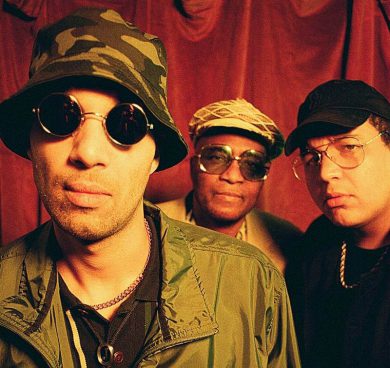 If being a good father means being an admiring father, Robin Kerr was undoubtedly a good father to his sons. “I remember recording this tape on a Fisher-Price tape recorder. It was a big deal back then, when you wanted to record something,” laughs the youngest of those sons, Greg Beaudin, while sitting in the record store and café 180g to discuss brown baby gone, Brown Family’s sophomore album, a trio composed of said father and his older brother Jam (K6A, Jam & Pdox).
If being a good father means being an admiring father, Robin Kerr was undoubtedly a good father to his sons. “I remember recording this tape on a Fisher-Price tape recorder. It was a big deal back then, when you wanted to record something,” laughs the youngest of those sons, Greg Beaudin, while sitting in the record store and café 180g to discuss brown baby gone, Brown Family’s sophomore album, a trio composed of said father and his older brother Jam (K6A, Jam & Pdox).
“So, yeah: I recorded this tape with all the songs I’d written and gave a copy each to my mom and dad for Christmas. My dad would play it EVERY DAY! It must’ve been horrible, but to my dad it was the best rap in the world just because it was me. I was 9 and I was a rap genius. I was the Mozart of rap.”
Some 20 years later, this mutual admiration between a father and his sons is one of the main engines that powers the evocative and profound aspect of Brown Family’s music, which lies somewhere in between rap, soul, and reggae. You see, even though the songs don’t directly celebrate family, at their core they all contain the ideal of a true father-son dialogue – a precious and rare opportunity that sadly eludes so many fathers and sons.
“This project enriches our family,” says Greg. “We didn’t see our dad very often, at some points, and this brought us closer. It was the occasion for good in-depth discussions on all kinds of topics that we’d never talked about before.”
Thus, the creation of their second album was the opportunity to have bona fide debates on the meaning of a text, for example. With a background rooted in reggae, daddy Robin prefers writing that has a simple nobility at its core, such as on “Tomorrow Night”: “The sky is grey, it can be blue right now / Life is sweet, it can be sweeter somehow / The sun is shining, yes, it shines so bright / Yes I say the moon is shining, shine so bright.”
“My brother and I like writing abstract stuff,” says Greg, better known as Dead Obies’ Snail Kid. “But our dad, he names things. If he writes a love song, he’s going to tell that girl he loves her at least eight times. He’s very down-to-earth. We clashed a bit on this initially, but he explained to us that it was important to him that what we say was understood by his people in Jamaica.”
So what does the man think of the sometimes “profane” language of his sons? Greg giggles, “He said it bugged him a couple of times. When something just doesn’t fly, we’re totally cool with fixing it. That’s what’s cool about this project: we have to all meet in the middle, everything has to be coherent. Without compromising what I want to say, I do realize that, sometimes, there are things that don’t fit within this project. The whole party-all-day and ego-trip culture is OK for Dead Obies, but not so much when I’m working with my dad.” In other words, one doesn’t behave the same way with one’s family as with one’s buddies.
Writing Tips
For Brown Family’s Greg and Jam, the most important thing is to throw as many ideas as possible out there, as fast as possible. “We’ll start with something simple, a looped sample, and we just spit out whatever comes to mind. It’s not always words, often it’s just sounds, a flow with two or three ideas. When you don’t work from a pre-written text, you’ll sometimes surprise yourself doing stuff you’d never have thought of otherwise. If I write my lyrics line by line, I always know where my punchline is going to land. So I play tricks on my brain.”
The Brown Family travelled to Jamaica for the first time towards the end of the creative process. It was back to his roots for Robin Kerr, and a first visit to the land of their ancestors for Greg and Jam, while producer Jean-François Sauvé took the opportunity to film a mini-documentary and a couple of videos.
“It’s hard to pinpoint what’s Jamaican in me,” Greg confides, having been born in Québec, from a Francophone Québécois mother. “We talked a lot about the Jamaican time frame before leaving, and I did notice how everything is much slower there. Poeple don’t rush, they take the time to appreciate things. Nobody fake-smiles, or does small talk. Everything that’s different about our dad in Québec makes sense over there.”